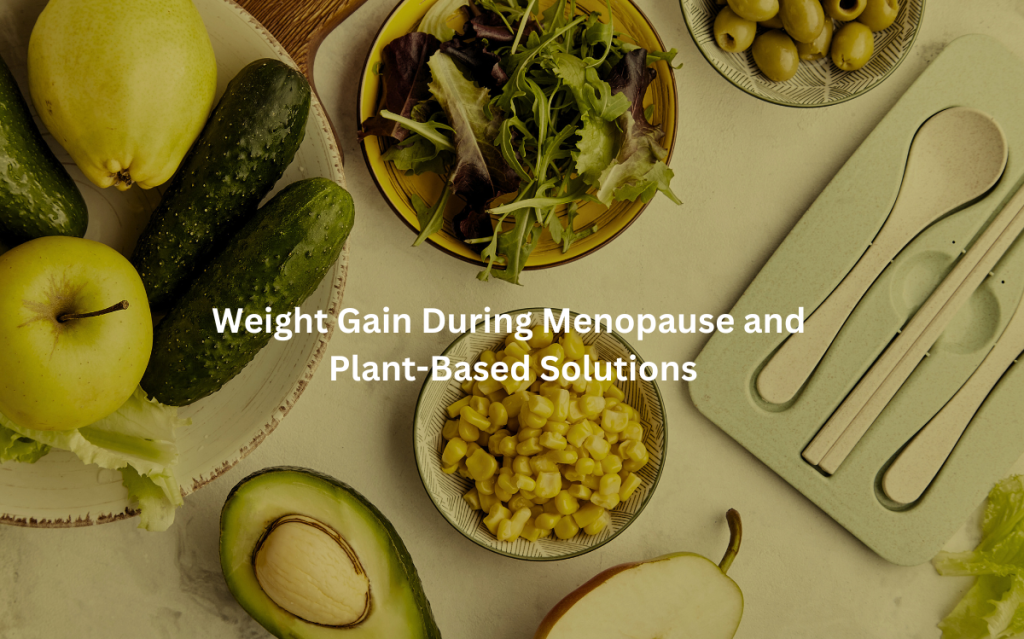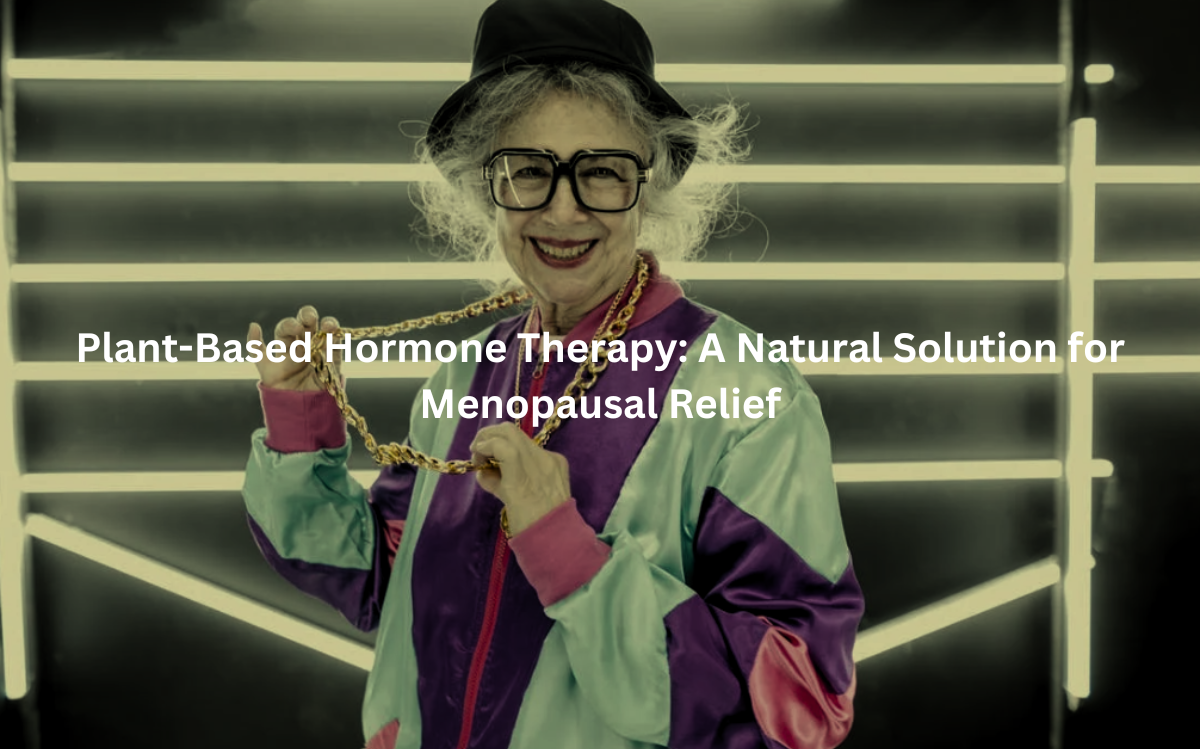Learn how plant-based hormone therapy can ease menopausal symptoms, including hot flashes, weight gain, and mood swings.
Plant-based hormone therapy offers a natural, effective way to manage menopausal symptoms, providing relief from hot flashes, weight gain, and hormonal imbalances.
With rising concerns over traditional hormone replacement therapy (HRT) and its side effects, many women are turning to plant-based options to navigate this life stage.
This therapy uses plant-derived compounds that mimic the body’s hormones, helping to restore balance without the risks of synthetic alternatives. (1)
Key Takeaways
- Natural Symptom Relief: Plant-based hormone therapy provides a safer alternative to synthetic hormones, reducing hot flashes and mood swings.
- Effective Weight Management: Helps manage menopausal weight gain by balancing hormone levels, improving metabolism.
- Customizable Treatment: Tailored to each individual, ensuring that menopausal women receive the best care for their specific needs.
Plant-Based Hormone Therapy: A Natural Alternative to Traditional HRT
Plant-based hormone therapy offers a potential alternative to traditional hormone replacement therapy (HRT) for managing menopausal symptoms.
Unlike synthetic hormones typically used in traditional HRT, plant-based hormones (phytoestrogens) are derived from plants and aim to mimic the natural estrogen produced in the body.
While both therapies serve similar functions, plant-based hormone therapy tends to be gentler and may be more appealing to women who are cautious about synthetic drugs.
The key difference between traditional HRT and plant-based alternatives lies in their composition—traditional HRT often uses synthetic or bioidentical hormones, while plant-based therapies rely on compounds like soy and red clover to help balance hormone levels.
One of the most significant benefits of plant-based hormones is their ability to address menopausal symptoms such as hot flashes, night sweats, and mood swings, offering a gentler approach to hormone balance. These therapies are also associated with fewer side effects compared to synthetic HRT, though their efficacy can vary from person to person.
Hot Flashes and Plant-Based Hormone Therapy
Hot flashes—they come out of nowhere, leaving a woman flustered and uncomfortable. For some, plant-based hormones offer a gentler way to cope with this menopause hallmark. (2)
These hormones (phytoestrogens) mimic natural estrogen by binding to its receptors, delivering a mild effect that can ease symptoms.
- Soy isoflavones: Found in foods like tofu and edamame, they may cut hot flashes by up to 50% in some studies.
- Red clover: Another phytoestrogen-rich plant, though results here vary.
- Flaxseed: A dietary addition that offers potential benefits.
Plant-based therapies take time to work. Weeks, maybe months. And for women battling severe hot flashes, these options might need backup. Pairing them with mindfulness, herbal supplements, or acupuncture might help bridge the gap.
Each treatment has its limits. That’s why women should experiment (safely) and combine strategies as needed. What works best? Usually a blend of relief, patience, and a bit of trial and error.
Weight Gain During Menopause and Plant-Based Solutions

Many women notice an increase in weight during menopause, often around the abdominal area. This is mainly due to hormonal changes, particularly a decrease in estrogen levels, which causes the body to store fat more readily.
Additionally, as women age, metabolism slows, and muscle mass tends to decrease, further contributing to weight gain.
Plant-based hormones, particularly those derived from soy and flax, can help mitigate some of the hormonal imbalances that contribute to weight gain. While plant-based solutions alone may not be a magic bullet for weight management, they can play a role in balancing hormones, which in turn may help reduce the weight gain associated with menopause.
In addition to plant-based hormone therapy, women are encouraged to adopt lifestyle changes, such as regular exercise and a balanced diet, to help manage their weight.
Strength training, in particular, is important during menopause to help maintain muscle mass and boost metabolism. A focus on healthy fats, lean proteins, and whole grains can also support weight management efforts.
Bioidentical Hormones vs. Compounded Bioidentical Hormones
Bioidentical hormones—chemically identical to the ones the body makes—can be a lifeline for women in menopause. But there’s a twist. While traditional bioidentical hormones (regulated by Health Canada) are tested for safety, compounded versions tell a different story.
- Custom-made: Pharmacies create these tailored formulas, which might sound perfect for individual needs.
- Unregulated risks: Lack of oversight means dosages can be off, and additives might not be safe.
- Efficacy questions: Without quality control, effectiveness can vary wildly.
Some women swear by compounded bioidentical hormones, but the risks (like harmful additives or unpredictable potency) make them a gamble. Meanwhile, regulated versions go through rigorous testing to ensure safety and consistent results.
For anyone considering HRT, sticking with regulated products seems like the safer bet. It’s about trusting the science—and protecting your health with something proven, not a shot in the dark.
Side Effects and Risks of Plant-Based Hormone Therapy
While plant-based hormone therapy is often praised for being a more natural and gentler approach to hormone replacement, it is not without risks.
Side effects are typically mild and may include nausea, headaches, or digestive issues. However, for some, the therapy may trigger allergic reactions or interact with other medications.
As with any hormone treatment, there are potential risks to be aware of, including increased chances of developing blood clots or certain types of cancer. Though these risks are generally lower with plant-based therapies than with traditional synthetic hormones, they still exist.
It’s crucial to monitor hormone levels regularly when undergoing plant-based hormone therapy. Healthcare providers often recommend periodic testing to ensure that hormone levels remain balanced and to adjust the treatment as needed. For instance, if a woman experiences severe side effects or finds the therapy ineffective, dosage adjustments or alternative treatments may be necessary.
Choosing the Right Hormone Therapy for Your Needs
Choosing the right hormone therapy depends on various factors, including age, health history, and the severity of menopausal symptoms. Women over 45 who are experiencing moderate to severe symptoms like hot flashes or mood swings may benefit from plant-based hormone therapy, especially if they are looking for a more natural approach.
Before starting any hormone therapy, it’s essential to consult with a healthcare provider who can evaluate personal health history and recommend a tailored treatment plan. Some key factors to consider include:
- Health history: If there is a family history of hormone-related cancers, a healthcare provider may recommend non-hormonal treatments or lower-risk hormone therapies.
- Symptom severity: Women with severe menopausal symptoms might require more aggressive treatments, while those with milder symptoms may find relief with plant-based options.
- Personal preference: Some women may prefer the natural approach of plant-based hormones over synthetic options, making them more likely to stick with treatment.
Asking the right questions—such as whether plant-based hormone therapy can interact with other medications or whether it could exacerbate any existing conditions—can help women make informed decisions about their care.
Non-Hormonal Alternatives for Menopausal Symptoms
While plant-based hormone therapy can be effective, it’s not the only option for managing menopausal symptoms. Non-hormonal alternatives can be especially useful for women who cannot or choose not to undergo hormone replacement therapy.
Some common non-hormonal treatments for hot flashes, mood swings, and other symptoms include:
- Herbal remedies: Black cohosh, red clover, and evening primrose oil are all believed to help alleviate menopausal symptoms. However, their effectiveness is still being studied, and results can vary.
- Supplements: Vitamins, particularly vitamin E and magnesium, have been shown to help with symptoms like hot flashes and sleep disturbances.
- Cognitive Behavioral Therapy (CBT): CBT has proven effective in managing mood swings and anxiety that often accompany menopause. By helping women address negative thoughts and emotions, CBT can offer relief without relying on hormones.
For women who prefer non-hormonal options, these treatments can serve as a valuable addition to lifestyle changes or plant-based hormone therapy.
The Role of Healthcare Providers in Menopausal Care
Healthcare providers play a critical role in managing menopausal care. They can help women navigate their symptoms, recommend the most suitable hormone therapy options, and monitor progress over time. Regular check-ins with a healthcare provider are essential, especially during the early stages of hormone therapy, to ensure that the treatment plan is working as intended.
A healthcare provider will also help identify when non-hormonal treatments or lifestyle changes might be more appropriate. For instance, if plant-based hormone therapy isn’t providing the desired results, they can suggest alternative treatments or adjust the dosage.
In addition to medical treatment, healthcare providers can offer valuable guidance on other aspects of menopausal care, such as nutrition, exercise, and mental health. Their support is key to ensuring that women experience a smooth transition through menopause and beyond.
Conclusion
Plant-based hormone therapy is a promising alternative to traditional hormone replacement therapy, especially for those looking for a more natural option. While it can help alleviate menopausal symptoms like hot flashes and weight gain, it’s essential to consult with a healthcare provider to tailor treatment plans to individual needs.
For women seeking non-hormonal treatments, a variety of supplements, herbal remedies, and therapy options are available. Regular follow-ups with a healthcare provider ensure that hormone levels stay balanced and risks are minimized.
Looking for a personalised approach to menopause care? Book your consultation with Modern Menopause today and explore the options that work best for you. Book your appointment now.
FAQ
What is plant-based hormone therapy for menopause?
Plant-based hormone therapy uses bioidentical hormones derived from plants to alleviate menopausal symptoms. These plant-based hormones, such as phytoestrogens, mimic the body’s natural hormones, like estrogen, helping to manage symptoms like hot flashes and night sweats.
They are often seen as a natural alternative to synthetic hormone replacement therapy (HRT) and may be an option for women seeking a gentler approach to menopause management.
How effective is plant-based hormone therapy for menopause symptoms?
Plant-based hormone therapy can be effective for some women in managing symptoms like hot flashes, night sweats, and mood changes.
Phytoestrogens, which are plant-derived compounds that resemble estrogen, bind to estrogen receptors and can help balance hormone levels. While results vary, many women find relief from their symptoms with fewer side effects compared to traditional HRT. However, its efficacy may not be as potent for severe symptoms in all women.
Are there risks associated with plant-based hormone therapy?
While plant-based hormone therapy is generally considered safe, it may still carry risks, especially if not used appropriately. These include potential interactions with other medications and underlying health conditions.
Unlike regulated bioidentical hormones, some plant-based treatments are not standardized, which can lead to inconsistent results. It’s crucial to consult with a healthcare professional to assess individual risks and determine if this approach is suitable, especially for women with a history of hormone-sensitive conditions.
How does plant-based hormone therapy compare to traditional HRT?
Plant-based hormone therapy offers a more natural approach to managing menopause symptoms compared to traditional hormone replacement therapy (HRT), which uses synthetic or bioidentical hormones.
While plant-based therapy may carry a lower risk of side effects, such as blood clots and breast cancer, its effectiveness can be variable. Traditional HRT is often more potent and better studied, making it a preferred choice for women with severe symptoms or significant health risks due to declining hormone levels.
Can plant-based hormone therapy be used long-term?
Plant-based hormone therapy can be used long-term, but it is essential to monitor the woman’s symptoms and overall health.
Since plant-based options may have a milder effect, long-term use might be beneficial for symptom management in some cases. However, the long-term impact on bone health, cardiovascular risk, and other factors should be carefully considered. Regular follow-ups with a healthcare provider are crucial to ensure ongoing safety and effectiveness.
References
- https://pubmed.ncbi.nlm.nih.gov/25436745/
- https://www.mayoclinic.org/diseases-conditions/hot-flashes/diagnosis-treatment/drc-20352795

Leave a Reply